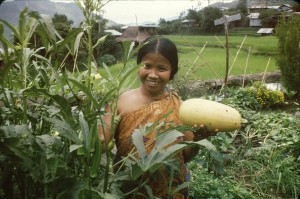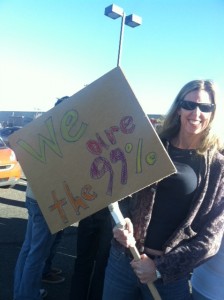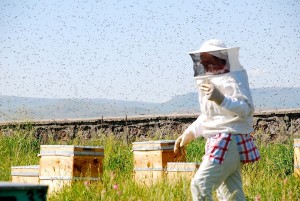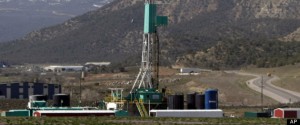On the day Steve Jobs died last fall, Occupy Wall Street organized the first massive march down though the Canyon of Heroes in New York, in the opposite direction of the route the New York Giants would take four months later. Swollen by busloads of stoic union troops, the small and somewhat ragged OWS band melded with a much larger crowd and dominated lower Manhattan from Foley Square to Trinity Church, a patch of turf Washington and Hamilton would surely still recognize for its geographic and economic centrality to the nation, if not for the shadows of the modern buildings and mounted police officers in riot gear.That news of Apple‘s
Continue reading... →More than 10,000,000 women live in rural parts of Turkey, and although Turkey has one of the world’s lowest employment rates for women (22%), women are working full-time (albeit unpaid) while they care for their large families and run small family farms. But in these remote villages, they are cut off from the city centers, so there are limited opportunities to translate this labor into income, educational opportunities, or professional development.
Organic beekeeping, particularly in rural untouched areas such as Northeastern Turkey is an ideal livelihood for women, because women are stable –therefore not moving their bees into areas with harmful crops or pesticides– and beekeeping can be done right from their backyards without taking away too much time from raising a family.
Continue reading... →Women have been at the forefront of the uprisings that started in Tunisia and soon cascaded west to Egypt, Libya, Yemen, Syria and across the Gulf. Over the past year, Arab women have relished the promise of a change — and found a new sense of equality long suppressed under sclerotic patriarchal regimes.
But many women activists fear that promise is now receding; and that women’s rights are being left on the political back-burner. In Egypt’s first post-Mubarak parliamentary elections — largely seen as the nation’s first free and fair vote — only nine of the newly elected 498 parliamentarians are women.
Popular Egyptian activist blogger Dalia Zaida says shortly before the elections, she conducted an informal poll of 1,400 voters across Cairo and found not a single person, male or female, who said he or she would vote for a female presidential candidate. Women across the region worry about this growing chasm between the reality of women’s unyielding participation on the streets and their stark absence from the formal political process.
Some secular female activists also fear that the rise of Islamist parties, whatever their professed moderation, will curtail their political space.
In Egypt, women have faced brutal treatment at the hands of the caretakers of the revolution — the Supreme Council of the Armed Forces. Activists describe its handling of protests as incompetent at best, and malevolent at its worst. Back in March, when the military forcibly expelled protestors from Tahrir Square — the epicenter of pro-democracy protests — 18 female activists were arrested, 17 of whom say they were forced to undergo “virginity tests,” (the military has claimed the tests were done to protect the army from possible allegations of rape).
Recently, hundreds of women from across the Middle East attended a conference in Egypt to discuss how technology and the Internet, namely social media, can be used to protect and advance women’s goals in the region. The Egyptian-American pundit Mona Eltahaway moderated the conference, taking the stage with both arms in casts. In November, she was sexually assaulted and beaten by soldiers near Tahrir Square. The plaster didn’t preclude her from articulating her message: “The most revolutionary thing a woman can do is share her experience as if it matters.”
As countries across the region struggle to dismantle inequitable systems and build civil society anew, these are just a few of the female “agents of change” who are sharing their experiences and have no intention of backing down.
Continue reading... →Jean Houston is in the air this weekend. My friends, Jennifer and Kimberly, spent some time in the middle of a women’s locker room discussing her contributions to the planet — and the role of women today. So I thought I’d share a special moment I had with her in Boulder, CO. Below is the transcript of my interview with this icon. Here’s the link to the audio. You’ll want to hear her say this. Oh what locker rooms can unlock!
Philosopher, scholar and cultural icon, Dr. Jean Houston is one of the foremost visionary thinkers and doers of our time, and one of the principal founders of the Human Potential Movement. She has worked intensively in 40 cultures and 100 countries helping to enhance and deepen their own uniqueness while they become part of the global community.
Continue reading... →From Huffington Post via Women Of Green
WASHINGTON — Natural gas drillers would be required to disclose the chemicals they use in hydraulic fracturing or “fracking” on public lands, according to draft rules created by the Department of Interior. The proposed regulations would also force companies to report the amount of any given chemical injected during the fracking process.
The move for increased regulation comes after President Barack Obama touted his commitment to expanding natural gas production while ensuring the drilling is done responsibly. “My administration will take every possible action to safely develop this energy,” he said during his State of the Union address last month. Fracking, which involves the high-pressure injection of undisclosed chemicals into rocks containing oil or natural gas, has drawn increasing scrutiny from environmentalists who suggest the process contaminates groundwater and destroys ecosystems.
Under the proposed regulations, companies would be required to reveal the “complete chemical makeup of all materials used,” according to a copy of the rules obtained by The Huffington Post. But environmentalists have noted that, while the regulations offer some “good elements,” the rules still offer companies considerable protections for “trade secrets,” an exemption some worry could negate the rule.
Interior Secretary Ken Salazar has said regulations will also cover well-bore integrity and regulation of flowback waters (the fluids that rise to the surface after hydraulic fracturing operations are complete). Further, reports detailing the ingredients used in the fracking fluids and a fluid treatment plan must be submitted 30 days before operations begin at any proposed well.
Interior spokesman Adam Fetcher elaborated in a statement.
Continue reading... →ADDIS ABABA, Ethiopia, A panel of current and former heads of government, ministers and lawmakers Monday launched a plan for world leaders to propel an “ever-green” energy revolution that could wean the world off fossil fuels, when they meet in Brazil later this year.
The report of the High-level Panel on Global Sustainability links the United Nations’ goals of reducing poverty and inequality to promoting the use of wind, solar and other renewable energy sources to power the economies of rich and poor nations alike.
The report, “Resilient People, Resilient Planet: A Future Worth Choosing,” contains 56 recommendations to put sustainable development into practice quickly, moving it from a general concept to the core of mainstream economics.
Continue reading... →
From Natural News
Purveyors of conventional and genetically-modified (GM) crops — and the pesticides and herbicides that accompany them — are finally getting a taste of their own legal medicine. Minnesota’s Star Tribune has reported that the Minnesota Court of Appeals recently ruled that a large organic farm surrounded by chemical-laden conventional farms can seek damages for lost crops, as well as lost profits, caused by the illegal trespassing of pesticides and herbicides on its property.
Continue reading... →Women hold only 3% of clout positions in the mainstream media. ~ Annenberg Public Policy Center, “The Glass Ceiling Persists”
Here are 15 ways the media would be different if it were run by 97% women and only 3% men:
From our friends at Living Green Magazine.
Canadian author and social activist Naomi has been a long-time critic of corporate globalization, which she addressed in her books The Shock Doctrine: The Rise of Disaster Capitalism and No Logo: Taking Aim at the Brand Bullies. On October 6, she spoke at Occupy Wall Street. Since amplified microphones are not allowed by the organizers, the crowd used their “human microphone” technique of having hundreds of people repeat her words so others further away could hear the message.
The speech was first reported in the Occupied Wall Street Journal and her longer print version was published in The Nation.
The following is the version from the Occupied Wall Street Journal, created by word of mouth.
Continue reading... →I was born and raised in a small ranch in Brazil, and since the early days, my mom always made sure that we ate all our veggies and finish our fresh acerola juice. She always let – and sometimes encouraged – my sisters and I go play in the rain and mud. We never got sick and grew up living this very healthy lifestyle. Until this day, my mom is a wealth of knowledge about what’s good for us (eat your flax seeds grounded, but only grind them before you eat, and keep them in the dark!) and she always finds the most unique things at the grocery store, before they become “fashion” like the chia seeds juice or kombucha.
Ecobold evolved from an idea that I had to help people learn how to shop for healthy items. While doing my research, I realized that there were many products out there beyond food that people would love to buy, but didn’t know that they exist or where to get them, so I decided to switch plans to an online marketplace that helps sellers all over the world market their amazing products to the people who want them. And Ecobold was born. We launched just a few months ago with 80 products and today we have almost 3,000 products available in many categories: from beauty, to food, to clothing and even electronics. Our goal is to help sellers market these products and help consumers find these small sellers who are popping up everywhere (but who don’t have a clue on how to do sales online or where to even start). Sellers on our site can be anyone from a mom who decided to make natural soaps in her spare time,to a small business owner selling non-toxic body lotions to their local spas. Since we are based in Silicon Valley, we are in a position to offer them the absolute best tools to show their baby to the world, increase sales, awareness and get repeat customers.
Continue reading... →







